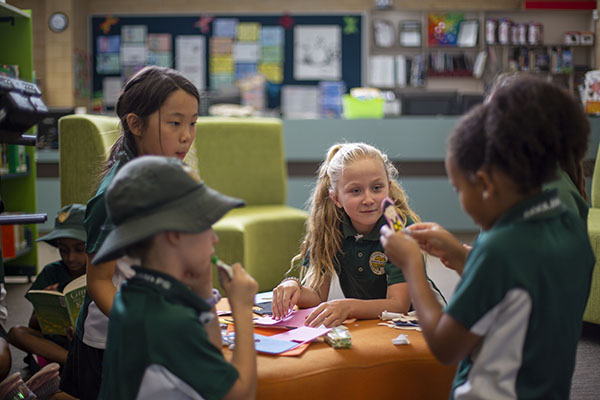Overview
Alignment with Be You Domains
-
Learning Resilience
Alignment with Early Years Learning Framework (EYLF)
- Children are effective communicators
- Children have a strong sense of identity
- Children have a strong sense of wellbeing
Alignment with Australian Curriculum
- Health and PE
Target audience
- Early learning
- Primary school
Target groups
- Whole class
- Whole school
Aims
The BRIDGE BUILDERS® Online Program provides whole-school community understanding, language and skills on resilience and effective communication. It aims to empower participants to self-regulate their emotions, deal with everyday conflict, reduce bullying and build healthy and positive self worth, relationships and success. The program provides skills and resources to equip staff, parents and students in a proactive and educative approach to empower children for life.Program theory
The program has been developed based on Glasser's choice theory, Ellis rational emotive theory and the principles of cognitive behavioural therapy. The program is also based on interpersonal problem-solving skills that encourage working towards cooperative win-win solutions.Topics
Self awareness and emotional regulation skills; de-escalating strategies, re-solving strategies, restoring strategies.Cost
Program structure
10 lessons for 30-40 minutes, weekly or fortnightly.Instructor
- External facilitator
- Educator
- Wellbeing leader
Instructor training
Face-to-face workshop (2???4 hours), including workbook and training aligned to the Australian Professional Standards for Teachers.Supporting resources or materials available with program
- Manual
- Workbook
Ongoing support
Built-in online professional development modules. Ongoing email and phone support. Ongoing observation and feedback.Parent involvement
- Follow-up information provided after program
- Homework
- Written information provided to parents
Origin of program
Australia
EMPOWERING Life Skills Pty Ltd
Program authors
Jocelyne Chirnside, Graeme Chirnside
- 17 Red Gum Pl,Mt Gravatt East QLD 4122 Australia
Ratings
Summary of evidence factors
This is a summary of the evaluation or research study characteristics that contribute to the program’s evidence rating.
|
Positive impact on at least one outcome for children and/or young people?
The study reported positive outcomes. |
No |
|---|---|
|
Link between program description and theory of change
Theory of change refers to whether there was a comprehensive description and illustration of how and why a desired change is expected to happen in a particular context. |
Comprehensive |
|
Study design
Type of study design reported. |
Pre-post cohort |
|
Independence
The degree to which the program authors were involved in the research. |
None |
Summary of implementation factors
This is a summary of the program’s characteristics that contribute to its implementation rating.
|
Feedback sought from participants
Participants enjoyed the program and understood its benefits. |
Yes |
|---|---|
|
Feedback sought from instructors
Instructors enjoyed the program and understood its benefits. |
No |
|
Groups program is not suitable for
Groups the program wouldn't be suitable for or that required further research to determine suitability. |
Not assessed |
|
Training provided during study
The model of training provided. |
Face to face, all instructors, in person |
|
Ongoing instructor support provided during study
Whether ongoing support is provided. |
Yes |
Context
This is a summary of the context in which the evidence for the program was established.
|
Study Participants
Pre school, primary school (Foundation to Year 6), secondary school (Years 7 to 12). |
Primary school |
|---|---|
|
Country of Study/s
The location in which the evidence or research was conducted. |
Australia |
|
Location of Study/s in Australia
The state (or states) the program was assessed in Australia. |
NSW |
|
Evaluation of program in culturally and linguistically diverse populations
Provider has included culturally and linguistically diverse people when assessing the program. |
No |
|
Evaluation of program in Aboriginal and Torres Strait Islander children and young people
Provider has included Aboriginal and Torres Strait Islander peoples when assessing the program. |
No |
|
Evaluation of program in low socioeconomic groups
Program has evaluated a diverse socio-economic population in their research. |
Yes |
|
Developmental based adaptations to program design and delivery
Shorter sessions for younger students or activities are adjusted for age appropriateness. |
No |
|
Evaluation of program in children and young people with disability and/or learning difference
Provider has included participants with a disability or learning difference when assessing the program. |
No |
Last updated: 24 November 2021
